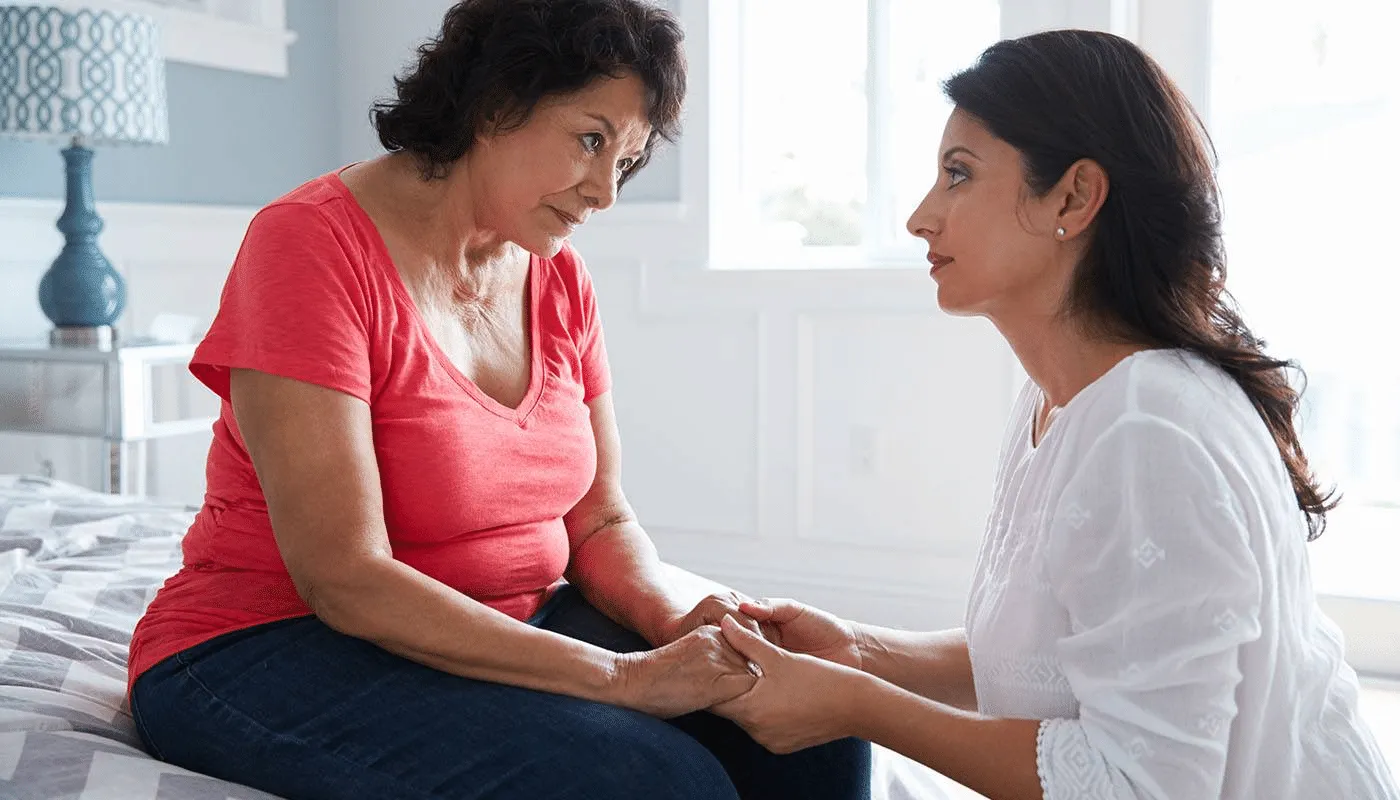Parkinson's disease can be complicated and quite an emotional experience. Suddenly, you or a loved one face a life-changing condition that can impact every aspect of daily living.It can be overwhelming to navigate the healthcare system to find the right care services for yourself or your loved one. However, there is hope. Home health care can provide compassionate and personalized support to help you or your loved one maintain independence, quality of life, and dignity in the comfort of your own home.At Nurse Next Door, we understand the challenges of living with Parkinson's disease and are here to provide assistance tailored to your unique condition and preferences.Let us help you on this journey so that you can focus on what matters most: living life to the fullest.

What Is Parkinson's Disease?
Parkinson's disease is a progressive condition that affects a person's movement and motor skills. It is a progressive neurological disorder that produces neurons in the brain, leading to tremors, muscle stiffness, and difficulty with balance and coordination. Parkinson's disease can cause non-motor symptoms like depression, anxiety, and cognitive changes [01].Symptoms usually get worse over time, and as the disease progresses, individuals may gradually have a more challenging time speaking or walking. Anyone could be at risk for Parkinson's disease, but it is typically correlated to age and genetics.Several other diseases and conditions mimic Parkinson's symptoms and may be cared for similarly [02]. These include:
- Dementia in Lewy bodies
- Essential tremors (ET)
- Corticobasal syndrome (CBS)
- Fragile X-associated ataxia syndrome (FXS)
- Arteriosclerotic parkinsonism (small strokes)
- Progressive supranuclear palsy (PSP)
- Normal pressure hydrocephalus (NPH)
For more information on Parkinson's disease, visit the Parkinson's Foundation website.
Can Parkinson's Disease Be Cared for At-Home?
Parkinson's disease affects a person's movement and increases balance problems. While there is no cure for Parkinson's disease, it is entirely possible to manage the symptoms and improve quality of life with proper personal care and support at home.Many individuals opt for a skilled nursing facility or nursing home, but more and more people hope to remain at home as they age. With improved healthcare and nursing agencies like Nurse Next Door, home care is much more accessible and desired.Caring for someone with Parkinson's disease at home can be challenging but very doable. As a primary caregiver of someone with Parkinson's disease, caring for them at home can be quite a rewarding experience. It does require patience, empathy, and a willingness to learn about the condition and how to manage it.If you're a family caregiver, one of the most important aspects of caring for someone with Parkinson's is to create a safe and supportive home environment. This may involve home modification to make it easier to move around and reduce the risk of falls. One area of high risk for Parkinson's patients is the bathroom. Therefore, bathroom modifications are highly recommended for someone with Parkinson's disease. Caregiving may also involve daily care by assisting with daily living, including bathing, meal preparation, dressing, etc.Another critical aspect of caring for someone with Parkinson's at home is to help them maintain their independence and quality of life. This may involve encouraging them to stay physically active, engage in activities they enjoy, or socialize with family members and friends.A family caregiver must work closely with the healthcare team to care for someone with Parkinson's at home. Caring for someone as the disease progresses is a challenging journey, but with the proper care services and support, it is possible to help your loved one live a fulfilling life.

Home Health Aide and Family Caregivers for Parkinson's Disease: Who Makes Up the Home Care Team?
When caring for someone with Parkinson's disease at home, it's essential to have a robust support system in place. It often includes a team of healthcare professionals and family caregivers who work together to provide the best possible care for your loved one.Several people make up the healthcare team for a person living with Parkinson's disease, including:
- Health Care Aide: A health care aide is a vital component of the home health care team. A paid caregiver that is trained to provide hands-on care at home. They can assist with in-home care services like around-the-clock care while supporting a family caregiver or substituting when they cannot independently care for their loved one.
- Family Caregivers: These people are family members who provide emotional support and companionship to their loved ones. They may also assist with daily tasks, such as helping their loved one get dressed or meal preparation. They can also provide valuable feedback to healthcare professionals about their loved one's symptoms and disease progression. Typically, an appointed primary caregiver is the main point of contact and source for their loved one and the healthcare team.
- Physicians: Medical doctors who diagnose and manage Parkinson's disease can provide prescription medications and coordinate in-home care with other healthcare professionals.
- Nurses: Registered nurses or LPNs provide a wide range of care and support to clients living with Parkinson's. They provide medication, pain, and symptom management and educate and guide clients and family caregivers.
- Physical Therapists: Physical therapy is important for those with Parkinson's disease. Therapists can help clients improve their mobility, balance, and overall physical function through exercises and other interventions.
- Occupational Therapist: These wonderful people are healthcare professionals who help patients regain independence with daily activities, such as bathing, dressing, and eating, through therapeutic interventions.
- Speech-Language Pathologists: Healthcare professionals who help patients overcome speech and swallowing difficulties that can result from Parkinson's disease.
- Social Workers: are professionals that can guide the family and support a person living with the disease. They can help with emotional support and counseling, provide resources, facilitate communication, and assist with financial and legal matters.
By working together, the Parkinson's care team can provide comprehensive care and support to help individuals with Parkinson's maintain their independence and quality of life at home. Remember, whether you have Parkinson's disease or are a caregiver for someone with Parkinson's - you are not alone. Many people are here to help you through this journey, including Nurse Next Door.
Contact us toll-free anytime for more information on how we can help you or your loved one with Parkinson's disease.
Call us at 1-877-588-8609
How do Home Health Care and Personal Care Services Support Parkinson's Disease?
Many personal and quality care services are available to support you or a loved one at home. These services can help maintain independence, manage the disease as the condition progresses, and improve the overall quality of life.Here are some ways that home health and personal care services can support Parkinson's disease at home:
- In-Home Care Services: In-home care services are typically provided by home health aides who are trained professionals that provide quality care with a hands-on approach. They can assist with basic caregiving and assistance with daily living, including bathing, dressing, grooming, light housekeeping, operating medical equipment, medication management (under the supervision of a nurse), physical assistance, and meal preparation.
- Physical Therapy: This can help improve mobility, balance, and overall physical function through exercise and interventions. Therapists can develop personalized treatment plans to assist at any stage of the illness. Physical therapists may be able to come to the home, or a health care aide may be able to support with transportation to clinics for appointments.
- Occupational Therapy: Occupational therapy can help a person regain independence with daily living and improve fine motor skills through therapeutic interventions. An occupational therapist can also develop a personalized treatment care plan that aids in supportive care for Parkinson's disease. Home health aides may provide transportation services while accompanying clients to appointments.
- Speech Therapy: This therapy can help overcome speech and swallowing difficulties. A speech-language pathologist can work closely with clients to help improve their function and support them where needed.
- Respite Care: Respite care can temporarily relieve family caregivers with in-home care, allowing them to take a break from caregiving duties. For more information on respite care, visit our respite services page.
- Companionship: Companionship provides emotional and mental support to individuals with Parkinson's disease. A companion can provide social engagement and accompaniment and participate in recreational activities. Companions are underrated and highly valuable for anyone living with Parkinson's or age-related illnesses.
When Is It Time to Get Outside Help?
As Parkinson's disease advances, it may be time to get outside help. Several signs could indicate it's time to consider professional support. These may include:
- Difficulty managing daily life, such as bathing, dressing, grooming, and nourishing with a healthy diet.
- Increased frequency or severity of falls.
- A decline in mobility or not being able to walk independently.
- Difficulty managing medications or other healthcare needs.
- Increased caregiver stress or burnout.
It's important to note that there is no one-size-fits-all answer to when to get professional support. The decision should be based on individual needs and circumstances. However, if your loved one is experiencing any of the signs listed above, it may be a good time to consider contacting a professional for additional support.There should not be shame in getting professional help; if anything, it will ultimately improve quality of life and provide much-needed relief to individuals with Parkinson's disease and their caregivers.

Remember, you are not alone. There are many resources out there to support your healthcare journey. At Nurse Next Door, we are committed to providing compassionate and personalized care for individuals with Parkinson's disease and support to family members.Our team of experienced caregivers and healthcare professionals will guide you and assist you every step of the way to make your daily life easier every single day.If you or a loved one requires home care for Parkinson's disease, we invite you to contact us to learn more about how we can support you. Let us be your partner in your care and help you live your best life at home!
It's about caring, not just health care™. We make it possible for seniors to live in their own home. Nurse Next Door home care's extraordinary family of Caregivers can take care of your loved one living with Parkinson's disease. Give us a call toll-free at:
1-877-588- 8609
Explore more topics on the Caring Blog. Read similar articles:2 Things You Need To Know As a Family CaregiverHow to Hire a Caregiver


























